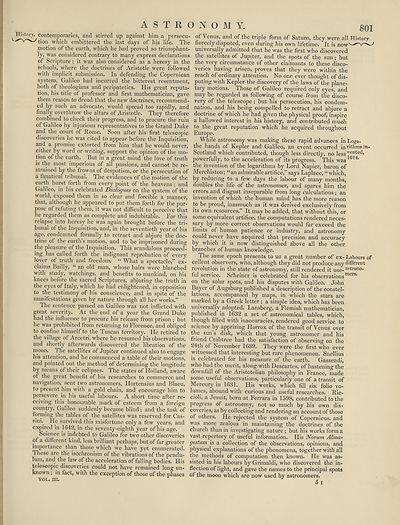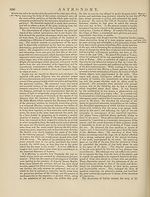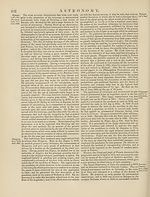Encyclopaedia Britannica > Volume 3, Anatomy-Astronomy
(809) Page 801
Download files
Complete book:
Individual page:
Thumbnail gallery: Grid view | List view

A S T R (
History, contemporaries, and stirred up against him a persecu-
tion which embittered the last days of his life. The
motion of the earth, which he had proved so triumphant¬
ly, was considered contrary to many express declarations
of Scripture ; it was also considered as a heresy in the
schools, where the doctrines of Aristotle were followed
with implicit submission. In defending the Copernican
system, Galileo had incurred the bitterest resentment,
both of theologians and peripatetics. His great reputa¬
tion, his title of professor and first mathematician, gave
them reason to dread that the new doctrines, recommend¬
ed by such an advocate, would spread too rapidly, and
finally overthrow the altars of Aristotle. They therefore
combined to check their progress, and to procure the ruin
of Galileo by injurious representatives to the Grand Duke
and the court of Rome. Soon after his first telescopic
discoveries he was cited to appear before the Inquisition,
and a promise extorted from him that he would never,
either by word or writing, support the opinion of the mo¬
tion of the earth. But in a great mind the love of truth
is the most imperious of all passions, and cannot be re¬
strained by the frowns of despotism, or the persecution of
a fanatical tribunal. The evidences of the motion of the
earth burst forth from every point of the heavens; and
Galileo, in his celebrated Dialogues on the system of the
world, exposed them in so clear and forcible a manner,
that, although he appeared to put them forth for the pur¬
pose of refuting them, it was not difficult to perceive that
he regarded them as complete and indubitable. For this
relapse into heresy he was again brought before the tri¬
bunal of the Inquisition, and, in the seventieth year of his
age, condemned formally to retract and abjure the doc¬
trine of the earth’s motion, and to be imprisoned during
the pleasure of the Inquisition. This scandalous proceed¬
ing has called forth the indignant reprobation of every
lover of truth and freedom. “ What a spectacle,” ex¬
claims Bailly, “ an old man, whose hairs were blanched
with study, watchings, and benefits to mankind, on his
knees before the sacred Scriptures, abjuring the truth in
the eyes of Italy, which he had enlightened, in opposition
to the testimony of his conscience, and in spite of the
manifestations given by nature through all her works.”
The sentence passed on Galileo was not inflicted with
great severity. At the end of a year the Grand Duke
had the influence to procure his release from prison ; but
he was prohibited from returning to Florence, and obliged
to confine himself to the Tuscan territory. He retired to
the village of Arcetri, where he resumed his observations,
and shortly afterwards discovered the libration of the
moon. I he satellites of Jupiter continued also to engage
his attention, and he commenced a table of their motions,
and pointed out the method of determining the longitude
by means of their eclipses. The states of Holland, aware
of the great benefit of his researches to commerce and
navigation, sent two astronomers, Hortensius and Blaeu,
to present him with a gold chain, and encourage him to
persevere in his useful labours. A short time after re¬
ceiving this honourable mark of esteem from a foreign
country, Galileo suddenly became blind; and the task of
forming the tables of the satellites was reserved for Cas-
sinh He survived this misfortune only a few years, and
expired in 1642, in the seventy-eighth year of his age.
Science is indebted to Galileo for two other discoveries
of a different kind, less brilliant perhaps, but of far greater
impoi tance than those which we have yet enumerated.
These are the isochronism of the vibrations of the pendu¬
lum, and the law of the acceleration of falling bodies. His
telescopic discoveries could not have remained long un¬
known ; in fact, with the exception of those of the phases
VOL. in.
) N O M Y. goj
of Venus, and of the triple form of Saturn, they were all History
fiercely disputed, even during his own lifetime. It is now'^-^v-^-^
universally admitted that he was the first who discovered
the satellites of Jupiter, and the spots of the sun; but
the very circumstance of other claimants to these disco¬
veries having arisen, proves that they were within the
reach of ordinary attention. No one ever thought of dis¬
puting with Kepler the discovery of the laws of the plane¬
tary motions. Those of Galileo required only eyes, and
may be regarded as following of course from the disco¬
very of the telescope ; but his persecution, his condem¬
nation, and his being compelled to retract and abjure a
doctrine of which he had given the physical proof, inspire
a hallowed interest in his history, and contributed much
to the great reputation which he acquired throughout
Europe.
While astronomy was making these rapid advances in Loga-
the hands of Kepler and Galileo, an event occurred in rhhms in-
Scotland which contributed, though less directly, no less vente‘h
powerfully, to the acceleration of its progress. This was^'4-
the invention of the logarithms by Lord Napier, baron of
Merchiston; “an admirable artifice,” says Laplace, “which,
by reducing to a few days the labour of many months,
doubles the life of the astronomer, and spares him the
errors and disgust inseparable from long calculations; an
invention of which the human mind has the more reason
to be proud, inasmuch as it was derived exclusively from
its own resources.” It may be added, that without this, or
some equivalent artifice, the computations rendered neces¬
sary by more correct observations would far exceed the
limits of human patience or industry, and astronomy
could never have acquired that precision and accuracy
by which it is now distinguished above all the other
branches of human knowledge.
The same epoch presents to us a great number of ex- Labours of
cellent observers, who, although they did not produce any different
revolution in the state of astronomy, still rendered it use-astrono*
ful service. Schemer is celebrated for his observationsmers’
on the solar spots, and his disputes with Galileo. John
Bayer of Augsburg published a description of the constel¬
lations, accompanied by maps, in which the stars are
marked by a Greek letter ; a simple idea, which has been
universally adopted. Lansberg, a Flemish mathematician,
published in 1632 a set of astronomical tables, which,
though filled with inaccuracies, rendered good service to
science by apprizing Horrox of the transit of Venus over
the sun’s disk, which that young astronomer and his
friend Crabtree had the satisfaction of observing on the
24th of November 1639. They were the first who ever
witnessed that interesting but rare phenomenon. Snellius
is celebrated for his measure of the earth. Gassendi,
who had the merit, along with Descartes, of hastening the
downfall of the Aristotelian philosophy in France, made
some useful observations, particularly one of a transit of
Mercury in 1631. His works, which fill six folio vo¬
lumes, abound with curious and useful researches. Ric-
cioli, a Jesuit, born at Ferrara in 1598, contributed to the
progress of astronomy, not so much by his own dis¬
coveries, as by collecting and rendering an account of those
of others. He rejected the system of Copernicus, and
was more zealous in maintaining the doctrines of the
church than in investigating nature ; but his works form a
vast repertory of useful information. His Novum Alma-
gestum is a collection of the observations, opinions, and
physical explanations of the phenomena, together with all
the methods of computation then known. He was as¬
sisted in his labours by Grimaldi, who discovered the in¬
flection of light, and gave the names to the principal spots
of the moon which are now used by astronomers.
5 i
History, contemporaries, and stirred up against him a persecu-
tion which embittered the last days of his life. The
motion of the earth, which he had proved so triumphant¬
ly, was considered contrary to many express declarations
of Scripture ; it was also considered as a heresy in the
schools, where the doctrines of Aristotle were followed
with implicit submission. In defending the Copernican
system, Galileo had incurred the bitterest resentment,
both of theologians and peripatetics. His great reputa¬
tion, his title of professor and first mathematician, gave
them reason to dread that the new doctrines, recommend¬
ed by such an advocate, would spread too rapidly, and
finally overthrow the altars of Aristotle. They therefore
combined to check their progress, and to procure the ruin
of Galileo by injurious representatives to the Grand Duke
and the court of Rome. Soon after his first telescopic
discoveries he was cited to appear before the Inquisition,
and a promise extorted from him that he would never,
either by word or writing, support the opinion of the mo¬
tion of the earth. But in a great mind the love of truth
is the most imperious of all passions, and cannot be re¬
strained by the frowns of despotism, or the persecution of
a fanatical tribunal. The evidences of the motion of the
earth burst forth from every point of the heavens; and
Galileo, in his celebrated Dialogues on the system of the
world, exposed them in so clear and forcible a manner,
that, although he appeared to put them forth for the pur¬
pose of refuting them, it was not difficult to perceive that
he regarded them as complete and indubitable. For this
relapse into heresy he was again brought before the tri¬
bunal of the Inquisition, and, in the seventieth year of his
age, condemned formally to retract and abjure the doc¬
trine of the earth’s motion, and to be imprisoned during
the pleasure of the Inquisition. This scandalous proceed¬
ing has called forth the indignant reprobation of every
lover of truth and freedom. “ What a spectacle,” ex¬
claims Bailly, “ an old man, whose hairs were blanched
with study, watchings, and benefits to mankind, on his
knees before the sacred Scriptures, abjuring the truth in
the eyes of Italy, which he had enlightened, in opposition
to the testimony of his conscience, and in spite of the
manifestations given by nature through all her works.”
The sentence passed on Galileo was not inflicted with
great severity. At the end of a year the Grand Duke
had the influence to procure his release from prison ; but
he was prohibited from returning to Florence, and obliged
to confine himself to the Tuscan territory. He retired to
the village of Arcetri, where he resumed his observations,
and shortly afterwards discovered the libration of the
moon. I he satellites of Jupiter continued also to engage
his attention, and he commenced a table of their motions,
and pointed out the method of determining the longitude
by means of their eclipses. The states of Holland, aware
of the great benefit of his researches to commerce and
navigation, sent two astronomers, Hortensius and Blaeu,
to present him with a gold chain, and encourage him to
persevere in his useful labours. A short time after re¬
ceiving this honourable mark of esteem from a foreign
country, Galileo suddenly became blind; and the task of
forming the tables of the satellites was reserved for Cas-
sinh He survived this misfortune only a few years, and
expired in 1642, in the seventy-eighth year of his age.
Science is indebted to Galileo for two other discoveries
of a different kind, less brilliant perhaps, but of far greater
impoi tance than those which we have yet enumerated.
These are the isochronism of the vibrations of the pendu¬
lum, and the law of the acceleration of falling bodies. His
telescopic discoveries could not have remained long un¬
known ; in fact, with the exception of those of the phases
VOL. in.
) N O M Y. goj
of Venus, and of the triple form of Saturn, they were all History
fiercely disputed, even during his own lifetime. It is now'^-^v-^-^
universally admitted that he was the first who discovered
the satellites of Jupiter, and the spots of the sun; but
the very circumstance of other claimants to these disco¬
veries having arisen, proves that they were within the
reach of ordinary attention. No one ever thought of dis¬
puting with Kepler the discovery of the laws of the plane¬
tary motions. Those of Galileo required only eyes, and
may be regarded as following of course from the disco¬
very of the telescope ; but his persecution, his condem¬
nation, and his being compelled to retract and abjure a
doctrine of which he had given the physical proof, inspire
a hallowed interest in his history, and contributed much
to the great reputation which he acquired throughout
Europe.
While astronomy was making these rapid advances in Loga-
the hands of Kepler and Galileo, an event occurred in rhhms in-
Scotland which contributed, though less directly, no less vente‘h
powerfully, to the acceleration of its progress. This was^'4-
the invention of the logarithms by Lord Napier, baron of
Merchiston; “an admirable artifice,” says Laplace, “which,
by reducing to a few days the labour of many months,
doubles the life of the astronomer, and spares him the
errors and disgust inseparable from long calculations; an
invention of which the human mind has the more reason
to be proud, inasmuch as it was derived exclusively from
its own resources.” It may be added, that without this, or
some equivalent artifice, the computations rendered neces¬
sary by more correct observations would far exceed the
limits of human patience or industry, and astronomy
could never have acquired that precision and accuracy
by which it is now distinguished above all the other
branches of human knowledge.
The same epoch presents to us a great number of ex- Labours of
cellent observers, who, although they did not produce any different
revolution in the state of astronomy, still rendered it use-astrono*
ful service. Schemer is celebrated for his observationsmers’
on the solar spots, and his disputes with Galileo. John
Bayer of Augsburg published a description of the constel¬
lations, accompanied by maps, in which the stars are
marked by a Greek letter ; a simple idea, which has been
universally adopted. Lansberg, a Flemish mathematician,
published in 1632 a set of astronomical tables, which,
though filled with inaccuracies, rendered good service to
science by apprizing Horrox of the transit of Venus over
the sun’s disk, which that young astronomer and his
friend Crabtree had the satisfaction of observing on the
24th of November 1639. They were the first who ever
witnessed that interesting but rare phenomenon. Snellius
is celebrated for his measure of the earth. Gassendi,
who had the merit, along with Descartes, of hastening the
downfall of the Aristotelian philosophy in France, made
some useful observations, particularly one of a transit of
Mercury in 1631. His works, which fill six folio vo¬
lumes, abound with curious and useful researches. Ric-
cioli, a Jesuit, born at Ferrara in 1598, contributed to the
progress of astronomy, not so much by his own dis¬
coveries, as by collecting and rendering an account of those
of others. He rejected the system of Copernicus, and
was more zealous in maintaining the doctrines of the
church than in investigating nature ; but his works form a
vast repertory of useful information. His Novum Alma-
gestum is a collection of the observations, opinions, and
physical explanations of the phenomena, together with all
the methods of computation then known. He was as¬
sisted in his labours by Grimaldi, who discovered the in¬
flection of light, and gave the names to the principal spots
of the moon which are now used by astronomers.
5 i
Set display mode to:
![]() Universal Viewer |
Universal Viewer | ![]() Mirador |
Large image | Transcription
Mirador |
Large image | Transcription
Images and transcriptions on this page, including medium image downloads, may be used under the Creative Commons Attribution 4.0 International Licence unless otherwise stated. ![]()
| Encyclopaedia Britannica > Encyclopaedia Britannica > Volume 3, Anatomy-Astronomy > (809) Page 801 |
|---|
| Permanent URL | https://digital.nls.uk/193767865 |
|---|
| Attribution and copyright: |
|
|---|---|
| Shelfmark | EB.16 |
|---|---|
| Description | Ten editions of 'Encyclopaedia Britannica', issued from 1768-1903, in 231 volumes. Originally issued in 100 weekly parts (3 volumes) between 1768 and 1771 by publishers: Colin Macfarquhar and Andrew Bell (Edinburgh); editor: William Smellie: engraver: Andrew Bell. Expanded editions in the 19th century featured more volumes and contributions from leading experts in their fields. Managed and published in Edinburgh up to the 9th edition (25 volumes, from 1875-1889); the 10th edition (1902-1903) re-issued the 9th edition, with 11 supplementary volumes. |
|---|---|
| Additional NLS resources: |
|

